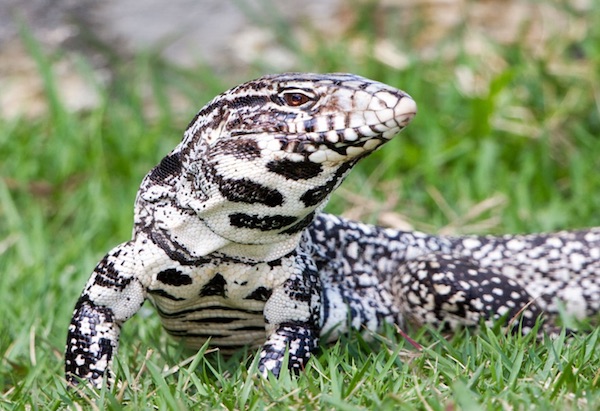Sometimes I really worry about my friends and family in Sub Carolina, also known as the Palmetto State of South Carolina.
Every time you turn around, they have problems with invasive species. Armadillos, Tegu lizards, Yankees – and now monkeys.
I guess the monkeys aren’t technically invasive, since they weren’t brought there for the express purpose of being released. The Yankees might not technically be an invasive species either, although the definition of such is a non-native species that forces out native flora and fauna. If you’ve ever been in traffic on Ocean Highway late on a summer afternoon, it’s challenging to find a South Carolina tag, but the Second War of Northern Aggression is a column for another day.
The monkeys in this case escaped from medical research lab near the town of Yemassee (if you are ever there, visit the old fashioned truck stop on I-95. The people are wonderful, the coffee fresh, and the fried chicken is delicious).

Initially the report said there were 41 to 43 Rhesus monkeys on the run. Over the weekend, during one of the dead news times, either the reporter misspoke or someone miscounted, since the score card was changed to a single monkey in custody, 41 missing, and dozens (my emphasis) running loose. How one cannot know exactly how many research monkeys one has in a lab is beyond me.
Supposedly there’s nothing to worry about, according to officials. The monkeys haven’t been subjected to any experiments yet, so they are not carrying any diseases, unlike the monkeys on Morgan Island.
Allegedly, that particular colony of Rhesus monkeys is rife with a mild form of a sexually transmitted disease, pardon the indelicacy. You can take boat tours and watch the monkeys from offshore, but the island is offlimits to visitors.
The cute little rascals are apparently thriving, despite hurricanes, the occasional really nasty cold snap and predators like alligators, bobcats, coyotes, hawks, eagles, and teenaged boys determined to win the love of their lives with a pet monkey.
The latter actually happened a couple years back. The young man had to be rescued from the island.
No word on whether he won the young lady’s heart, but he at least deserves a grade A for effort, with an F in common sense.
South Carolina just has no luck confining exotic species at research facilities. Remember about a decade ago, when they built a “snake proof” enclosure to see if pythons could survive in South Carolina, as they have in Florida? All the snakes were gone in a month. Something like 200 lineal feet of carnivorous serpents (around 30 snakes of various species) somehow got loose, without tracking chips. Officials assured everyone that the snakes wouldn’t survive the winter, but considering that the research hadn’t been conducted yet, I’m not sure how they would know.
I worry for my dear friends in South Carolina, including my chosen and blood family. The armadillos which we now have here in the Superior (or North) Carolina, are problematic enough.
A few years ago, I talked to a fellow who lives near Charleston, and his lawn and garden were overrun by armadillos. He bought a suppressor for his .22 handgun because the new neighbors were panicking every time they heard a shot from his house. He said his motion sensors go off so much that he is fairly sure he’s harvested several dozen of the armored possums in his sleep. Armadillos are not related to possums, by the way, but taxonomy is also a column for another day.
Armadillos can be troublesome, but (a) they aren’t very smart (b) they aren’t that destructive and (c) they don’t carry nearly as much leprosy as mythology would have you believe. Some can and do carry leprosy, as well as other nasty diseases, but they aren’t any more germ-ridden than the average snapping turtle, and they bite less. They’re just kind of there, scuttling along, panicking and jumping straight up when they cross a road in front of a car. All I can figure is that the average armadillo is so fatalistic that he decides if he going to be taken out by an automobile, he is going to cause as much damage as possible.
Our own armadillo invasion mostly began in the counties bordering – guess where? – South Carolina. It’s not fair to blame Palmettoans for the growing number of Dasypus novemcinctus in our state, but they’re convenient scapegoats.
Of much more concern than the Rhesus monkeys and nine-banded armadillo are the Tegu lizard.
Tegus were a very popular pet lizard, before people realized that reptiles with easy food tend to not stop growing. That led to folks doing like people do with too many unwanted pets: they began turning the darn things loose.
However, unlike puppies and kittens, there are fewer softhearted individuals who will stop and pick up a four-foot long biting lizard off the side of the road.
Tegu lizards are gorgeous animals, with broad stripes like a skink, and large strong mouths full of sharp teeth. They’re amazingly adaptable, since they come from a mountainous region in South America where it sometimes gets in the 30s and 40s. Plus they can tolerate high heat and humidity, and moderate rainfall.
If you think I just described the climate in most of North and South Carolina, you are correct.
The Tegu are amazing reptiles. They are more omnivorous than the average possum. They’ll eat eggs, birds, small mammals, leaves and plants, turtles, and supposedly even pets like cats and small dogs. They’re fast and stealthy, and while they’re rarely known to bite humans, they can inflict some serious injury.
Thankfully, Tegus have not gained much of a foothold in North Carolina. South Carolina finally banned ownership of the lizards. If you had a Tegu before the state ban went into effect, you may keep it, but it must not be turned loose. In South Carolina, the number of confirmed sightings is increasing every year, but officials insist the critters aren’t breeding. Instead, officials said people are violating the law by releasing more of them, as they become too big to keep.
Uh-huh. Yeah. Sure.
The critters aren’t breeding. And everyone is following the law. Sure. Right.
So think of our friends in Sub Carolina. Wild primates, armadillo hordes, and Tegu lizards. Never mind snakeheads and walking catfish.
Fairly soon I’m sure there will be monkeys riding armadillos while they round up pythons to sell to tourists at South of the Border. Will capybaras soon be crawling out of drainage ditches and running rampant in Columbia? Perhaps someone will accidentally release a hippo or two from a “research facility” into the Sampit River at Georgetown. Maybe they’ll open a real Jurassic Park in Myrtle Beach.
Better still – maybe that little diner I knew and loved years ago will start offering Tegu and python sandwiches, served by Rhesus monkeys.
It’s South Carolina – stranger things have happened.
-30-







